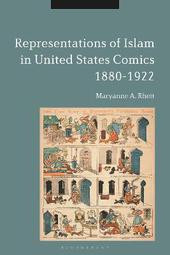
|
Representations of Islam in United States Comics, 1880-1922
Hardback
Main Details
| Title |
Representations of Islam in United States Comics, 1880-1922
|
| Authors and Contributors |
By (author) Maryanne A. Rhett
|
| Physical Properties |
| Format:Hardback | | Pages:200 | | Dimensions(mm): Height 234,Width 156 |
|
| Category/Genre | Islam |
|---|
| ISBN/Barcode |
9781350073241
|
| Classifications | Dewey:741.5973 |
|---|
| Audience | | Tertiary Education (US: College) | |
|---|
| Illustrations |
26 bw illus
|
|
Publishing Details |
| Publisher |
Bloomsbury Publishing PLC
|
| Imprint |
Bloomsbury Academic
|
| Publication Date |
19 September 2019 |
| Publication Country |
United Kingdom
|
Description
Representations of Islam in United States Comics, 1880-1922 examines the depiction of Islam, Muslims, and the Islamic world in U.S. popular culture, particularly comics and related artifacts, between 1880 and 1922. Through cartoons, comics, editorial cartoons, serialized advertisements and other materials the book unfolds a narrative about how the Islamic world and its people were understood by the American government and its people. This "knowledge," garnered from popular culture of the day, produced a lens through which domestic and international relationships were created and maintained. Representing a wide swath of U.S. popular culture and discourse, the reflections these artifacts offer are united in their depiction of the "Oriental" in an era that is largely assumed to have been marked by American un-interest in the region, peoples and religion. An exciting contribution to a growing field, this book resituates the U.S. within the Islamic world, using the everyday medium of comics to provide a fresh perspective on the subject.
Author Biography
Maryanne A. Rhett is Associate Professor of Middle Eastern and World History at Monmouth University, USA. She is the author of A Global History of the Balfour Declaration (2015).
ReviewsMaryanne Rhett provides evidence for the claim that comics matter - that they tell us something about society and the collective meanings we have made of the world around us, both as far back as the late 19th and early 20th century platinum age of comics and - by implication -- today. She uncovers political cartoons and comics strips that are otherwise buried, fluently reads them as art and text, and inserts them into a discourse informed by Edward Said and Yvonne Haddad. Critically, this work extends our understanding of Islam in the United States, and American visions of Islam, to an era often ignored by other scholars. * Trevor Getz, Professor of History, San Francisco State University, USA *
|